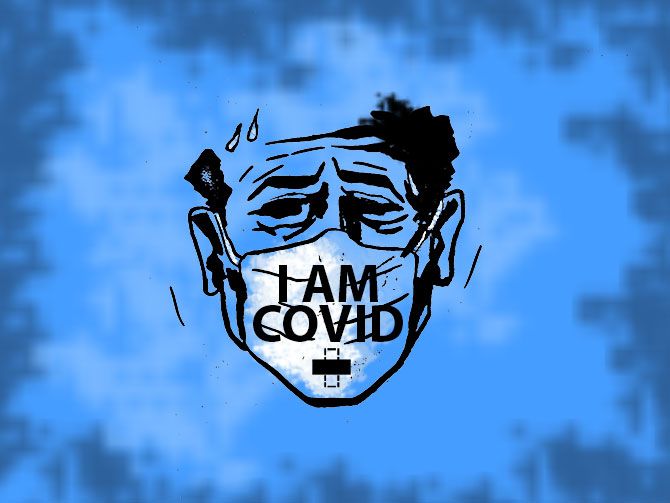Social stigma associated with COVID-19 has led to people denying that they, or their family members, have it -- and this will make the task of containing the pandemic much harder, notes Geetanjali Krishna.
Illustration: Dominic Xavier/Rediff.com

As we enter the third month of the Covid-19 pandemic, I find that the disease is inching frighteningly close.
For the time has come when people one knows, or at least knows if, are contracting the infection.
Conversations with the families of people who have tested positive have made me realise that the virus may infect one person but its impact is borne by every single member of his/her household.
This was brought home to me when Seema called me.
She used to be a cook until she found a more lucrative job as a medical attendant. "I lost my job as soon as the lockdown began," she said.
"So I thought I'd ask you if you knew of anyone who needs a medical attendant right now." Her entire family had fallen on hard times, she said to me.
"My son-in-law is out of work as well at the moment," she said, "so if you know of someone who needs a male nursing attendant, he's your man."
The household had been surviving on the free rations provided by the government. "Sometimes I think I would be better off if I returned to my village in West Bengal," she said.
"But train tickets are hard to get and from all that I have heard, the journey itself is even harder."
Even if she braved the journey home, Seema said that the idea of two weeks of quarantine outside the village boundaries was a deterrent.
I was sorry to hear her tale of woe, especially because a couple of weeks ago, I'd learnt from the local grapevine that her daughter, a nurse in a private hospital who lives in Khizrabad, had contracted COVID-19.
Being adjacent to our neighbourhood, the rising cases of coronavirus there have been a source of alarm.
As most of my neighbours are hesitant to even call their regular part-time staff back to work, the chances of their hiring someone new, that too to attend to an immunity-compromised family member, were dim.
When I told her as much, she asked if there were any openings I knew of cooks or housekeepers. "I will do any sort of work," she said. "I really need the money."
I could hear the desperation in her voice and offered to tide her over her present circumstances. "And how is your daughter?" I asked. "Has she completely recovered from COVID-19?"
My query was met with a long silence, followed by a rant. "Who told you my daughter had COVID-19?" Seema demanded to know.
"She's absolutely hale and hearty." She insisted that her daughter had simply had viral fever with a bit of cough.
"I didn't think someone like you would believe such vicious rumours," she said before hanging up hastily.
It seemed an unlikely coincidence that the news that her daughter had fallen prey to COVID-19 had spread during the same time as her son-in-law and she lost their jobs.
It was also no coincidence that they hadn't been able to find new jobs either.
But there is so much social stigma associated with COVID-19 now that more and more people are denying they, or their family members, have had it in the first place -- and this will make the task of containing the pandemic that much harder.
Production: Rajesh Alva/Rediff.com











